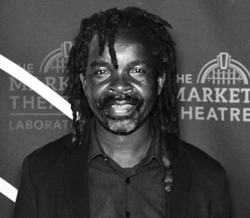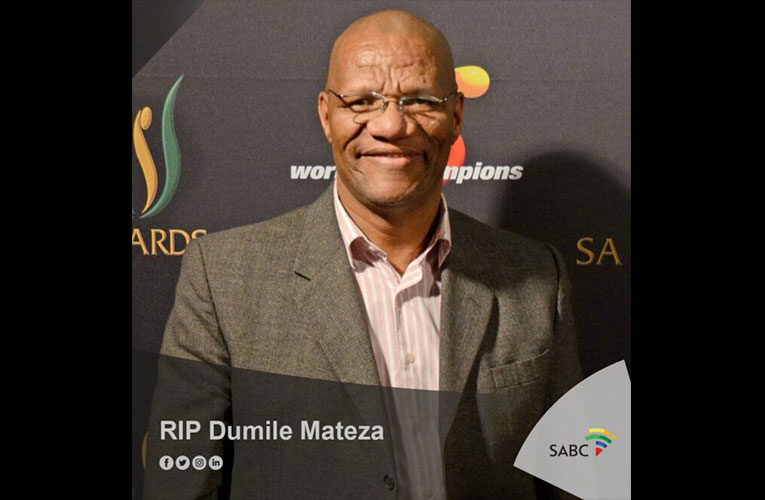Tribute to Dumile Mateza the legendary sports commentator ‘who spoke isiXhosa in English ‘
By Edward Tsumele, CITYLIFE/ARTS Editor

I cannot claim to have been his friend or a fan of his work on both television and radio where he plied his trade as a sports commentator since 1980s, even though our paths crossed several times over the years, especially at Niki’s Oasis in Newtown where both of us happened to be regulars at some stage in our lives. We both bombed on each other there to enjoy drinks on several occasions.
My lack of interest in his work had nothing to do with whether the man did a good job or not. If truth be told, he did and did it so well that even a person like me who was never his fan was intrigued by his commentaries that came out as incisive, knowledgeable and quite convincing to hear. His on air confidence, delivery of commentary in flawless English, isi Xhosa and Afrikaans sometimes, and add, his famous accent, then you had a unique individual that many wanted to watch and listen to, especially those in the sporting community or had an interest in the sports he commentated on. And they were quite wide, such as boxing, rugby and cricket. His English accent was also the talk of town. It had become so legendary to an extent that many had something to say about it, such as that even when he was commentating in isiXhosa, his mother tongue, Dumile Mateza spoke isiXhosa with an in English, just like those who spoke isiXhosa or other African languages with an English or Afrikaans accent.
Mateza was however more than his accent as his knowledge of several sporting codes was impeccable and his articulation the admiration of many in the industry. Though his detractors made jokes about his accent, it was not his problem the way he chose to speak the language, but a problem of society that is obsessed with the ‘right’ way of speaking this language, as If there is actually any right way to do so. In any case there are several Englishes spoken in the world by specific communities. Even in the UK, where English emanates from, there is no one English, as specific communities, such as the Irish, the Walsh and the Scottish speak it their own way, and so do Americans.
For example, those coming from different States in the US, speak different Englishes, and so should it be. Whether Mateza spoke American English or British English, is neither here nor there. He spoke his English, and we could hear him too, and that is what is important folks.
But one thing you could not fault him with though, is the fact that even though his detractors had these uncomplimentary remarks about his accent, they loved him, and even loved him more, especially for that. In other words, Mateza understood the art of broadcasting, and one of whose integral elements is to perform the job, and not just become a talking head. He did that effectively.
The difference though between him and the others is that he was damn knowledgeable and had so much confidence in not only what he said, but also how he said it. He was simply in a class of his own.
Therefore my personal general lack of interest in his commentaries both on radio and TV, had something to do with my own narrow taste when it comes to entertainment in general, and sport in particular. In fact until recently, when my son started participating in a host of sport disciplines at school, such as football, cricket and rugby, in which case, I have to have an interest in my son’s sporting activities as you can imagine, I have never been a lover of mainstream sport, with the exception of a few of them, including long distance running, watching some tennis and golf games, in that order.
This however doe s not mean that Mateza’s talent as a sports commentator escaped mainstream sport sceptics, such as me and a few other fellow sport snobs. To suggest otherwise would be a lie. There was no way of escaping noticing, the intrigue of how this Eastern Cape born teacher-turned sports commentator, created a niche for himself in sport broadcasting, taking him to major sporting events globally.
The truth is, Mateza who died on Tuesday, February 1, 2022, was gifted, unparalleled in both articulation and knowledge of the sports he commentated on, whether it was rugby, boxing or cricket, and whether he was doing it in isiXhosa, Afrikaans (legend has it that he once commentated on an entire World Rugby match in which the Springboks took on an opponent in Afrikaans), or English.
In a nutshell that is the uniqueness he brought to sport commentating in this country.
It is a pity though that the great sports commentator Mateza, just like many of his generation, was conspicuous by his absence on both radio airwaves and TV screens at the time he passed on. This is perhaps the tragedy of the current trend whereby once someone gets old, somehow, ironically the powers that be, believe that you become less experienced and therefore less popular with audiences and you need to be replaced by young blood. Logic though dictates that the opposite is true.
An example to the contrary is Larry King, who died holding the mike and he rocked the world with is knowledge of global affairs till his death due to Covid-19 last year. There is a lesson to learn for local broadcasters here.
His former employer, the SABC however in their statement acknowledge the contributions Mateza made to the art of sport broadcasting and commenced paying tribute to him on several of its sports platforms from yesterday, February, 2022.
”The South African Broadcasting Corporation (SABC) is saddened by the passing of the veteran broadcaster, Mr. Dumile Mateza.
The broadcaster extraordinaire joined the public service broadcaster in the early 1980s and served the Corporation with diligence as an Independent Contractor until the end of his tenure in 2018. His versatility and multilinguistic skills made him a perfect fit for both SABC television and radio platforms. One of the most memorable highlights of his broadcasting career was commentating the 1995 Rugby World Cup matches in Afrikaans.
His in-depth knowledge of sport broadcasting and the ability to relate to the diverse sport audiences, made him one of the most enchanting sports commentators in the South African broadcasting industry.
He also had a great interest in News and Current Affairs which cemented his immense contribution to the delivery of the SABC’s public mandate of informing, educating and entertaining the South African citizenry.
Mr. Mateza has left an indelible mark in the industry and his legacy will serve as a motivation and inspiration to upcoming sports broadcasters.
SABC Sport will pay tribute to Mr Dumile Mateza from tonight on #SportsNightLive with Andile Ncube, on Radio 2000 at 18h00 and on The Ultimate Sport Show with Thomas Mlambo on Metro FM at the same time. Viewers can also look forward to a dedicated show on Sunday, 6 February 2022 from 14:30 – 17:30 on SABC 1 titled A Tribute To Dumile Matezaunder the theme Celebrating the life of the sports encyclopaedia.
The SABC Board, management, and staff, extends heartfelt condolences to the Mateza family and friends,” the SABC released a statement yesterday.
Mateza aged 62, died from cancer on Tuesday, according to his family and he has been ill for sometime. He was born Kareedouw in the Eastern Cape, and like many black broadcasters who emerged during the apartheid years, he was a teacher first and became a broadcaster in the early 80s.










